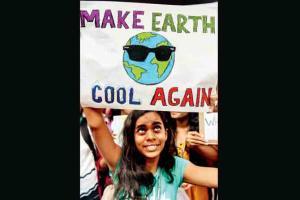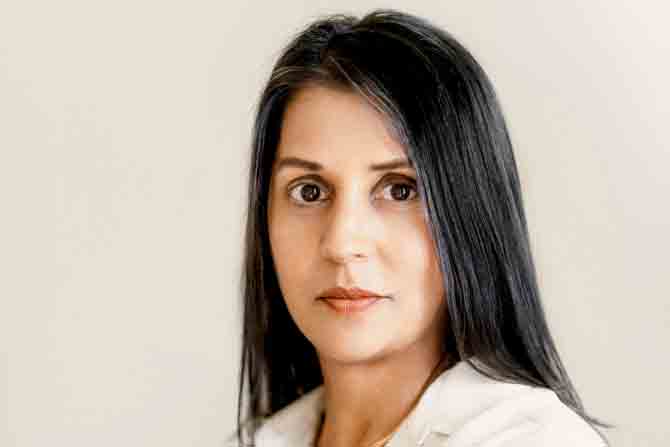Noted American science journalist Sonia Shah believes the enemy in the war against pandemics isn't another country, but industrial expansion at the cost of climate abuse

A file photo of a student holding a poster at Fridays for Future climate strike in Mumbai to protest against governments' inaction towards climate breakdown and environmental pollution. Pic/ Getty Images
Every disease begins as an alien concept, before it starts becoming familiar. Coronavirus is no different. But the scale and speed at which the infection has spread, is unsettling and leaves no room for familiarity. American science journalist Sonia Shah, who has been invested in the study of infectious diseases, says, "Pathogens have had a tremendous and under-reported influence on human history, as we're seeing this unfold before our eyes right now." Shah is the author of The Fever (2010), a book where she tracked the history and spread of malaria, and the 2017 title Pandemic: Tracking Contagions from Cholera to Ebola and Beyond.
ADVERTISEMENT
She started writing about health and infectious diseases "as a way to understand the origins of inequalities"—those that existed between men and women, between rich and poor, between the healthy and the sick, both within and between societies. "Having malaria in your society, for example, reduces GDP growth. And it has shaped our history, our bodies, our settlement patterns for millennia," she says in an email interview from Baltimore. It might be too soon to say how the Coronavirus will change us. But Shah, who is set to release her new book, The Next Great Migration: The Beauty and Terror of Life on the Move, feels that governments "will have to juggle between losing lives and livelihoods" before this one passes.
Edited excerpts from the interview.
The Corona group of viruses has been around for the last two decades—we've lived through SARS and MERS. This time, of course, the strain is deadlier. Yet, we were unprepared. Why so?
We were not as prepared as we could have been—or should have been—if we'd made rational decisions based on scientific understanding and historical events. But, we were probably more prepared than we were a decade ago. When the first SARS wave struck, the scientific community was in the dark for weeks and international collaborations were slow and fitful. We're doing much better with scientific collaboration in the face of COVID-19. It's not enough, obviously. The problem isn't that we don't prepare or progress at all, but that we do it far too slowly.
Corona has been labelled as a Chinese virus, one time too many. You've described this as "microbial xenophobia". How does it change the way we look at the pandemic, once it's all over?
It's politically useful for leaders to scapegoat outsiders, whether they are people from another country, or an institution like the WHO, or political rivals or wild animals. That externalises the threat, which recuses them from accountability. But the truth is that our own actions have provided the opportunities for this virus to spread, and it is our own actions that will arrest it. To scapegoat others is to cast the pandemic as a problem of invasion, in which we are passive victims. That obscures both its origins and its cure.
The stories we tell about pandemics presents us as victims of nature. But, in the past, you've spoken about how it's actually the other way around. If we aren't the victims, who is?
That's one way to tell the story and it leads to certain policy solutions—closing borders, perhaps, or immobilising people deemed contaminated. But what science tells us is that just as in any other human-mediated disaster, we are both the victims and the culprits. The animal microbes that cause outbreaks of novel disease have mostly existed in animals, harmlessly, for years. They become pathogens because of human activity.
 Sonia Shah. Pic courtesy/Glenford Nunez
Sonia Shah. Pic courtesy/Glenford Nunez
You've shared your concerns about the speed at which pathogens have been emerging, and spreading in the recent past. How much of this is man-made?
The global industrial machine, which gobbles up wildlife habitat and ferries commodities and people from one remote corner of the planet to the other, is broadly implicated in the emergence of most of the novel pathogens we've been seeing over the last 50 years or so. Since 1940, there have been hundreds of these pathogens newly emerging or re-emerging into places where they've never been seen before. SARS-Cov2 is just the latest. Most of them come from the bodies of animals. They have spilled over into human bodies thanks to industrial expansions and have been carried across the planet through our travel network.
Many climate experts have claimed that Corona is just a warning of the worst that is to come. Do you think that infectious diseases are going to be of grave concern, when the effects of climate change really hit us?
The effects of the climate crisis are already being felt. Pathogens and vectors are moving into new places where they couldn't survive before, which is resulting in outbreaks of mosquito-borne disease and tick-borne disease in populations that have never experienced these. Warming seas are helping cholera bacteria thrive. Perhaps the biggest impact climate change will have on the disease burden is by simply changing its pattern. That means more people will encounter new pathogens, which means a heavier burden of disease, since they won't have any acquired immunity to them.
You have mentioned the need for a differentiated approach, especially by developing nations, when it comes to tackling the contagion. India's national lockdown has affected the poorest of poor. What approach do you think would have been best?
The universal lockdown was necessary because by the time governments decided to act, we no longer had the capacity to understand where the virus is actually present. If we'd started screening and testing earlier, when the need would have matched the testing capacity, we might have been able to track its spread and avoid these brute measures. They will have deadly effects on the poor and the marginalised, the scale of which will only become apparent later. Obviously, social distancing and hand hygiene are not solutions that are available to all. They sound simple and easy but in fact for many, they are as inaccessible as a $10,000 cancer treatment. In the long term, we need to be able to provide safe housing and clean water to all, as a fundamental human right and also to protect public health.
From your previous studies, how long do you think it would be, before we go back to living normal lives?
We'll have successive waves of infection, each a bit less steep than the last. Those could be managed with widespread testing/screening and contact tracing; the way sporadic outbreaks of polio or measles are today. But most countries won't have the technical capacity or sufficiently effective governance for that. They'll probably have to resort to intermittent shutdowns, in which governments will have to juggle between losing lives and livelihoods. That will go on for a year or two until we have a vaccine or develop herd immunity. It'll be messy and politically fractious. But I do believe that we will get back to business as usual much faster than most people now expect, for better or worse.
Catch up on all the latest Mumbai news, crime news, current affairs, and a complete guide from food to things to do and events across Mumbai. Also download the new mid-day Android and iOS apps to get latest updates.
Mid-Day is now on Telegram. Click here to join our channel (@middayinfomedialtd) and stay updated with the latest news
 Subscribe today by clicking the link and stay updated with the latest news!" Click here!
Subscribe today by clicking the link and stay updated with the latest news!" Click here!






